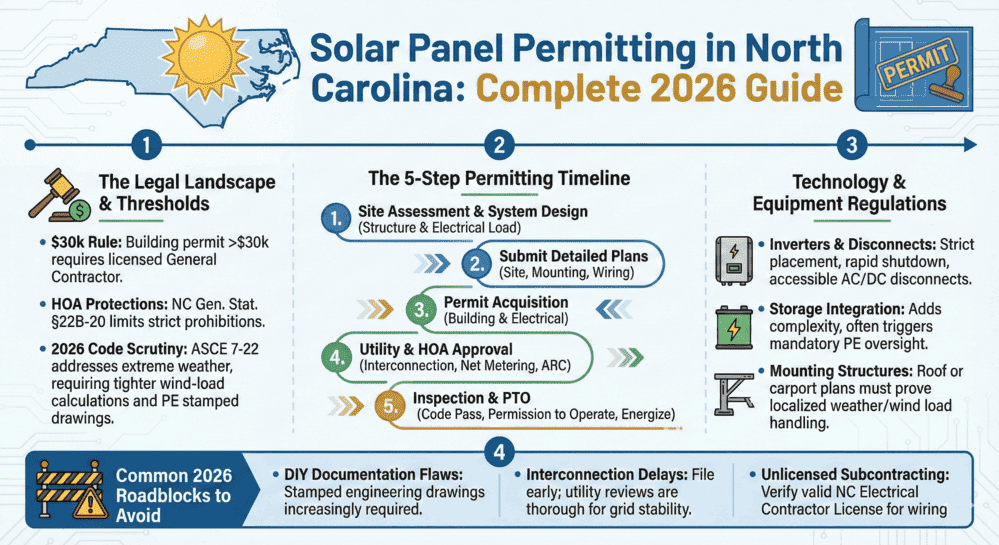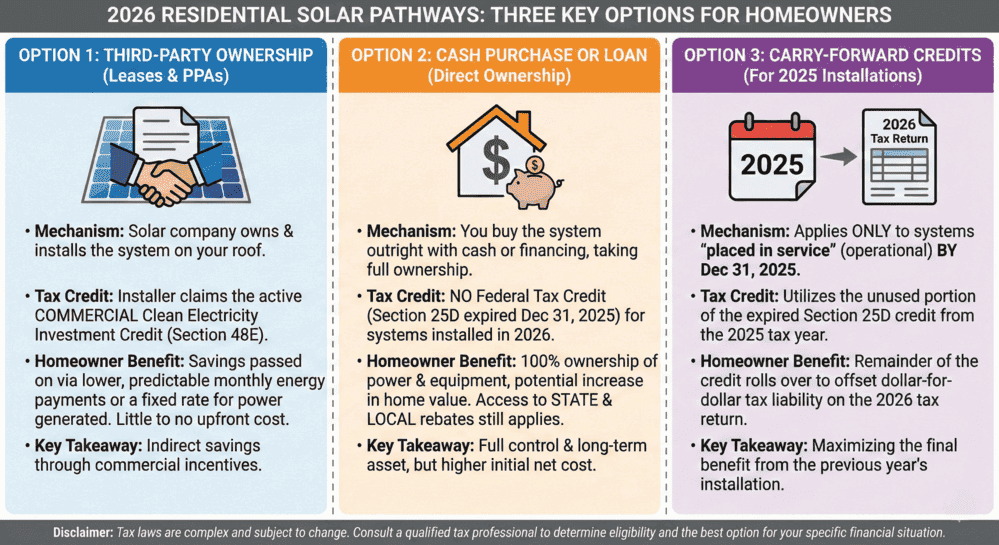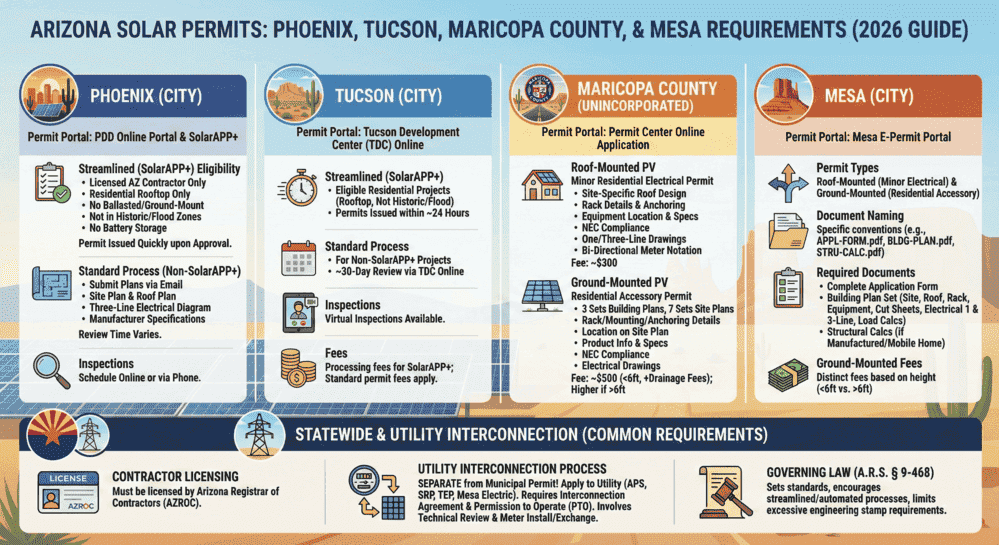Rhode Island requires a statewide solar energy permit application for all solar photovoltaic installations across all 39 municipalities. The standardized permitting process combines building and electrical permits into one application, administered by the Rhode Island Office of Energy Resources in partnership with the State Building Code Commission.
Key permit requirements include:
- Property owner information and installation site address
- System specifications (AC and DC capacity, interconnection location, mounting type)
- Contractor credentials and license numbers
- Single-line electrical diagram and equipment specifications
- Structural engineering documentation for roof or ground mounting
- Additional certification forms for systems 15kW AC or larger
Current Rhode Island solar statistics (2024-2025):
- 872 megawatts of installed solar capacity statewide
- Solar contributes 9% of Rhode Island’s total electricity generation
- Average residential system size: 10.89 kilowatts
- Typical permit approval timeline: 2-4 weeks
- Installation costs: $2.94-$2.98 per watt before incentives
The unified permit application became mandatory on January 1, 2018, replacing inconsistent municipal processes that previously varied across cities and towns. This standardization reduces soft costs, accelerates approval timelines, and ensures predictable requirements regardless of project location. Solar Permit Solutions specializes in navigating these regulatory frameworks efficiently.
Why Rhode Island Consolidated Solar Permitting
The statewide solar energy permit application delivers a predictable and universal framework for securing necessary permits for solar photovoltaic installations. Rhode Island consolidates building and electrical permits into one comprehensive application, eliminating redundant paperwork and reducing processing timelines for applicants.
This unified approach replaces the previous system where each municipality maintained separate permitting procedures with varying requirements and deadlines. The standardization reduces soft costs associated with solar development and accelerates project approval timelines throughout the state.
State Agencies Governing Solar Permits
The Rhode Island Office of Energy Resources established these regulations in partnership with the Rhode Island State Building Code Commission. All municipalities throughout the state must utilize this standardized application process, ensuring consistent procedures regardless of project location.
Starting January 1, 2018, every city and town in Rhode Island adopted this unified permitting framework. The regulations apply to all solar project scales, from small residential rooftop installations to large commercial ground-mounted systems. Major cities like Providence offer additional resources for solar adoption support.

Solar Terminology Every Applicant Should Know
Understanding key technical terms ensures accurate application completion:
Alternating Current (AC): The electrical current type utilized in residential and commercial power systems throughout the United States. Solar systems must convert their output to AC for grid compatibility.
Direct Current (DC): The electrical current produced directly by solar panels. This power flows in one direction and requires conversion through an inverter before household or grid use.
Inverter: Equipment that transforms DC electricity generated by solar panels into AC electricity compatible with standard electrical systems and the utility grid.
Photovoltaic System (PV System): An integrated arrangement of solar panels, inverters, mounting structures, and related components that converts sunlight into usable electricity.
Energy Storage: Technology that captures solar energy produced during peak generation periods for use during high-demand times or when sunlight is unavailable.
Grid: The commercial electric power distribution network that transmits electricity from generation sources to end users through transmission lines and local distribution systems.
Solar Permit Solutions
Skip the Permit Headaches
We design plan sets that pass inspection the first time. Code-compliant, PE-stamped, accepted by AHJs nationwide.
What Documents Your Permit Application Needs
The statewide solar energy permit application requires several specific elements for complete submission. Understanding these permit application requirements ensures accurate documentation from the start:
Property And Owner Information
Applications must include the property owner’s complete name and address, along with the exact installation site location. This information establishes jurisdiction and ensures proper tax assessment procedures.
System Technical Specifications
Detailed specifications encompass the total PV system size measured in both AC and DC capacity, interconnection point location, and mounting structure classification (roof-mounted, ground-mounted, carport, etc.). These specifications determine structural requirements and electrical safety protocols.
For residential systems, the average installation size in Rhode Island measures 10.89 kilowatts, generating approximately 13,000 kilowatt-hours annually. Professional residential solar design services ensure proper system sizing. Commercial systems typically range from 25 kilowatts to several megawatts depending on facility requirements.
Energy Storage Documentation
Projects incorporating battery storage systems require additional documentation specifying storage capacity, intended purpose (backup power, load shifting, or demand response), and charging methodology. As of 2024, Rhode Island has established an energy storage procurement target of 195 megawatts by 2028, creating growing opportunities for solar-plus-storage installations. Some property owners also explore off-grid solar solutions for maximum energy independence.
Contractor Credentials
Applications must list all contractors involved in the project, including business names, addresses, and relevant license numbers. Electrical work requires documentation of licensed electrician credentials in accordance with Rhode Island state regulations.
The Residential Solar Energy Disclosure and Homeowners Bill of Rights Act, effective March 2025, mandates that all residential solar retailers maintain annual registration with the Department of Business Regulation. This requirement ensures consumer protection and industry accountability.
Structural And Roofing Details
For roof-mounted installations, applicants must describe existing roofing materials, weatherproofing methodologies, and structural engineering specifications. The mounting system must comply with Rhode Island building codes and demonstrate adequate load-bearing capacity.
Ground-mounted systems require documentation of foundation design, soil conditions, and setback compliance with local zoning regulations.
Electrical Diagrams And Equipment Specifications
Applications require submission of a single-line electrical diagram illustrating panel configuration, voltage specifications, kilowatt output, main service panel capacity, and overcurrent protection devices. This diagram ensures safe integration with existing electrical infrastructure.
Complete manufacturer specifications for all major components (solar panels, inverters, racking systems, and monitoring equipment) must accompany the application. Understanding solar permit equipment requirements prevents application delays. Equipment must carry UL listing or equivalent certification demonstrating safety compliance.
Site Plans For Ground-Mounted Systems
Ground-mounted installations require detailed site plans showing property boundaries, structure locations, solar array placement, access roads, utility connections, and any required vegetative buffers or screening. These plans ensure compliance with zoning ordinances and environmental regulations.
Some municipalities require landscape plans incorporating native species from the Rhode Island Native Plant Database to minimize visual impact and support local ecosystems. Planning resources provide guidance on solar site design considerations.
Certification Forms For Large Installations
Solar systems rated at 15 kilowatts AC or larger require additional certification forms confirming compliance with structural engineering standards and electrical codes. These forms typically require professional engineer stamps for structural calculations and load analysis. Commercial solar design projects frequently exceed this threshold and need comprehensive engineering documentation.

Current Financial Incentives And Programs
Rhode Island offers multiple incentive programs that significantly reduce solar installation costs:
Federal Investment Tax Credit
Property owners installing solar systems qualify for a 30% federal tax credit on total project costs, including equipment, labor, and permitting fees. This credit applies to installations completed before December 31, 2025. The federal solar incentive phases down to 26% in 2033 and 22% in 2034 under current legislation.
Renewable Energy Fund (REF)
The Rhode Island Commerce Corporation administers the REF program, providing upfront grants to residential and commercial solar installations. Residential systems qualify for $0.65 per watt, capped at $5,000 maximum. Commercial projects receive starting rates of $0.70 per watt with a maximum grant of $400,000.
Battery storage systems installed concurrently with solar qualify for an additional $2,000 residential grant or up to $40,000 for commercial installations. The program operates on scheduled application periods throughout the year, with limited funding requiring advance coordination with installers. Property owners can research additional state incentives through comprehensive databases.
Renewable Energy Growth (REG) Program
This state-administered program allows participants to sell solar production directly to Rhode Island Energy under 20-year fixed-price contracts. The 2025 program year offers rates of 33.85 or 32.35 cents per kilowatt-hour depending on system classification. This provides predictable revenue streams and superior financial returns compared to standard net metering for qualifying systems.
Net Metering
Rhode Island Energy operates a robust net metering program providing 1:1 credit for excess solar generation at full retail rates. Credits roll over indefinitely as dollar values, offering flexibility for seasonal production variations. As of February 2024, participants can request cash payouts for excess credits or transfer them to other accounts under their ownership. Educational institutions also participate in these programs successfully.
Sales Tax And Property Tax Exemptions
Rhode Island provides automatic sales tax exemption on all solar equipment purchases, eliminating the state’s 7% sales tax. This exemption saves approximately $1,190 on typical residential installations averaging $17,000.
The property tax exemption protects solar owners from increased assessments due to system installation, preserving tax bills at pre-installation levels regardless of added property value. This exemption continues indefinitely as long as the system remains operational. Additional guidance appears in the Solar Permit Solutions blog regularly.
Permitting Timeline And Process Expectations
The standardized permitting process typically requires 2-4 weeks for application review and approval once complete documentation is submitted. However, projects participating in the REF program may experience delays up to 12 weeks while awaiting application block dates and grant processing.
Municipalities conduct plan reviews to verify code compliance, structural adequacy, and electrical safety. Some jurisdictions require additional inspections during installation and upon completion before authorizing utility interconnection.
Property owners should coordinate with qualified installers familiar with Rhode Island’s permitting requirements. Experienced contractors streamline documentation preparation and navigate municipal review processes efficiently. Avoiding common permit mistakes accelerates approval timelines significantly.

Installation Costs And System Pricing
As of 2025, average solar installation costs in Rhode Island range from $2.94 to $2.98 per watt. A typical 5-kilowatt residential system costs approximately $14,923 before incentives, while the state average system size of 10.89 kilowatts costs around $32,556 before any rebates or tax credits.
After applying the 30% federal tax credit and available state incentives, most residential installations achieve payback periods of 6-7 years. Over typical 25-year system lifespans, Rhode Island homeowners realize average savings of $133,000 on electricity costs. State solar data confirms these economic benefits consistently.
Commercial installations benefit from economies of scale, with larger systems achieving lower per-watt costs and shorter payback periods due to higher daytime electricity consumption patterns.
Consumer Protection And Regulatory Compliance
The Residential Solar Energy Disclosure and Homeowners Bill of Rights Act enhances consumer protections throughout the solar purchasing process. Solar retailers must provide standardized disclosure forms detailing system performance expectations, total costs, financing terms, and ownership transfer procedures.
Door-to-door solar solicitors must wear photo identification displaying their name, registration number, and the registered solar retailer they represent. These requirements enable proper verification and accountability for consumer interactions.
The Department of Business Regulation maintains a registration database of licensed solar retailers and tracks consumer complaints. Property owners should verify retailer registration before signing contracts and carefully review all documentation before making commitments. Efficient permit processing strategies protect both installers and customers.
Conclusion
Rhode Island’s comprehensive solar permitting framework establishes clear procedures for obtaining necessary approvals across all municipalities. The standardized application process reduces complexity, accelerates timeline, and supports continued solar adoption throughout the state.
By understanding permit requirements, leveraging available incentives, and working with qualified contractors, property owners can successfully navigate the approval process. The combination of streamlined permitting, robust financial incentives, and high electricity rates makes Rhode Island one of the most attractive solar markets in the northeastern United States.
Taking advantage of current federal and state incentive programs before scheduled reductions maximizes financial benefits and accelerates return on investment. Property owners considering solar installations should initiate consultations with licensed contractors to evaluate site suitability and begin the permitting process without delay. Professional solar permitting services handle all regulatory requirements comprehensively.
FAQs
Skip the Permit Headaches
We design plan sets that pass inspection the first time. Code-compliant, PE-stamped, accepted by AHJs nationwide.
Frequently Asked Questions
The standardized permitting process typically requires 2-4 weeks for application review and approval once complete documentation is submitted to municipal authorities. However, projects participating in the Renewable Energy Fund (REF) program may experience extended timelines up to 12 weeks while awaiting application block dates and grant processing. Expedited processing may be available for straightforward residential installations that meet all code requirements without modifications. Working with experienced installers familiar with Rhode Island's requirements helps minimize delays and ensures proper documentation from the start.
Yes, all 39 municipalities in Rhode Island are required to use the statewide solar energy permit application established by the Office of Energy Resources. This standardized process became mandatory on January 1, 2018, eliminating the previous system where each city and town maintained separate permitting procedures. The unified application covers both building and electrical permit requirements in a single submission, regardless of whether the project is residential or commercial, roof-mounted or ground-mounted. This consistency ensures predictable timelines and requirements across the entire state.
Solar installations rated at 15 kilowatts AC or larger require additional certification forms confirming compliance with structural engineering standards and electrical codes. These systems typically need professional engineer stamps for structural calculations and load analysis to verify that mounting systems and roof structures can safely support the equipment. Larger commercial systems may also require more detailed interconnection studies with Rhode Island Energy to ensure grid compatibility. The permitting authority may request additional documentation regarding fire safety access, setbacks, and equipment specifications for these larger installations.
While property owners technically can submit permit applications themselves, most work with licensed solar contractors who handle the permitting process as part of their installation services. Licensed contractors possess familiarity with technical requirements, proper documentation formats, and municipal review processes that expedite approvals. Additionally, the Renewable Energy Fund (REF) program requires that only licensed solar installation companies apply for grants on behalf of property owners. Electrical work must be performed by licensed electricians regardless of who submits the permit application, as required by Rhode Island state regulations.
The permit application requires a single-line electrical diagram showing the solar panel configuration, voltage specifications, kilowatt output, main service panel capacity, and overcurrent protection devices. This diagram demonstrates safe integration with existing electrical infrastructure. Applicants must also submit complete manufacturer specifications for all major components including solar panels, inverters, racking systems, and monitoring equipment with UL listing or equivalent certification. For roof-mounted systems, documentation must describe existing roofing materials, weatherproofing methods, and structural engineering specifications proving adequate load-bearing capacity. Ground-mounted installations require site plans showing property boundaries, array placement, utility connections, and any required setbacks or vegetative buffers.
While the statewide permit process is uniform, local zoning ordinances may impose specific restrictions on solar installations. Ground-mounted systems typically cannot exceed 12 feet in height measured from original grade to the highest panel point, though some municipalities allow exceptions for solar parking canopies in commercial zones. Systems proposed within historic districts or on properties listed in the National Register of Historic Places require additional review and approval from local historic commissions. Some municipalities require vegetative buffers for larger ground-mounted installations to minimize visual impact from neighboring properties. HOA regulations may impose aesthetic requirements or placement restrictions that must be addressed before permit submission.
Battery storage systems installed concurrently with solar panels are typically covered under the same statewide solar permit application. The application includes specific fields for documenting energy storage components, their capacity, intended purpose, and charging methodology. However, adding battery storage to an existing solar installation may require a separate electrical permit modification to update system specifications and ensure proper integration. Battery systems must comply with fire safety codes, which may include requirements for dedicated enclosures, ventilation, and fire suppression equipment depending on system size and location. Properties adding storage should verify specific requirements with their municipality and installer before proceeding.
SPS Editorial Team
Solar Permit Solutions
Solar Permit Solutions provides professional solar permit design services for residential, commercial, and off-grid installations across all 50 states. Our team ensures permit-ready plan sets delivered fast.
Related Articles

New 2026 North Carolina Solar Permit Guide: Duke Energy & Storage Rules
Learn North Carolina solar panel licensing and permitting requirements. Discover...

Section 25D Expiration: Homeowner Options In 2026
The Section 25D Residential Clean Energy Credit, which covered 30% of residentia...

Solar Permits In Arizona: Phoenix, Tucson, Maricopa County, And Mesa Requirements (2026 Guide)
Arizona solar permitting at a glance: Arizona HB2301 now requires every municipa...
